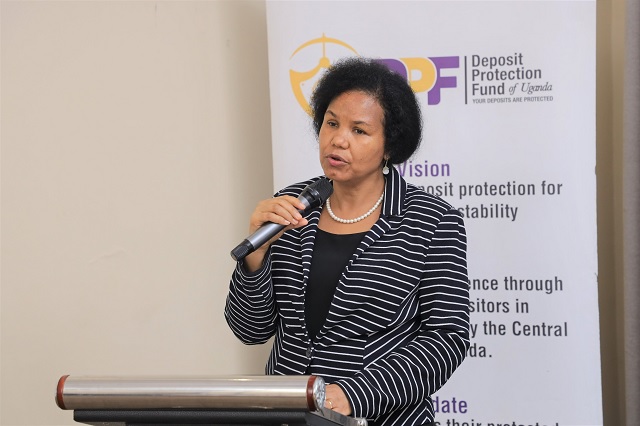
Kampala, Uganda | THE INDEPENDENT | The Deposit Protection Fund-DPF, is moving towards instant payment of depositors in case a bank closes, under the digitization program objectives of the fast-growing fund.
Currently, the Fund is confident they can start compensating depositors ‘in the unlikely event of a bank closing, a month after, while the law provides for three months.
The DPF currently guarantees that in case of a bank collapsing, each depositor can be compensated with up to 10 million shillings of their deposits in the financial institutions that are regulated by the Bank of Uganda.
Julia Oyet says that this is aimed at reducing on the frustration that the depositors may get when their compensation delays at it happened in previous cases, adding that with time, they would want to start paying on the first day of closure.
This will partly be achieved by the digitization program the Fund is currently installing to improve its operations, according to officials.
The Depositor Payout and Premium Management System will enable the Fund pay the depositors conveniently and fast using various payment channels like Mobile Money.
Balaam Ssempala, Director Information Technology at the Fund says the process includes aligning the information that they have, with the National Identification and Registration Authority-NIRA as well as the telecommunication companies.
He says that this would help the verification process move faster especially as different payment platforms are also being adopted, like mobile money.
While so far the digitalized payment system has been rolled out to four commercial banks, some client details are not yet complete, with about 20 percent of account holders yet to furnish their National ID details with the banks.
Oyet says that all these will be part of a massive sensitisation campaign this year.
The DPF is also embarking on onsite inspections of the contributing (BOU-regulated institutions) to ensure that the records they have correspond with what is submitted to the DPF and also reflect the premiums they deposit with the DPF.
The Fund’s size grew 15 percent to 1.15 trillion shillings in June 2022 from June 2021, a trend attributed to the increased investments in government securities.
The law only allows DPF to invest in assets that can instantly be turned into cash because at any one time, it must be able to pay the depositors their money when directed by the Bank of Uganda, according to Alan Lwetabe, the Head of Investments.
He says that they are accordingly supposed to ensure that that deposits grow in line with the rate of inflation to ensure that the value of the deposits is not eroded by inflation.
CEO Oyet says the growth would have been higher during the year, but that the general effects on the economy caused by high commodity prices and high inflation also impacted on the Fund’s performance.
The total amount of deposits over the same period grew from 31 trillion shillings to 33 trillion shillings, while the number of bank accounts increased from 19.1 to 20.7 million.
According to the statement on the annual performance, at the current protection limit if 10 million shillings per account, 98 percent of the total deposit accounts in the banking sector are fully protected by DPF.
On those accounts that hold more than 10 million shillings, the depositors are “encouraged to ‘know their bank’ by regularly monitoring their performance using credible sources of information,” according to DPF.
However, the DPF assured the country and the banking public that the financial sector remains resilient to potential risks, supported by strong capital and liquidity buffers, coupled with “prudent policy measures” by the central bank.
*****
URN
 The Independent Uganda: You get the Truth we Pay the Price
The Independent Uganda: You get the Truth we Pay the Price





